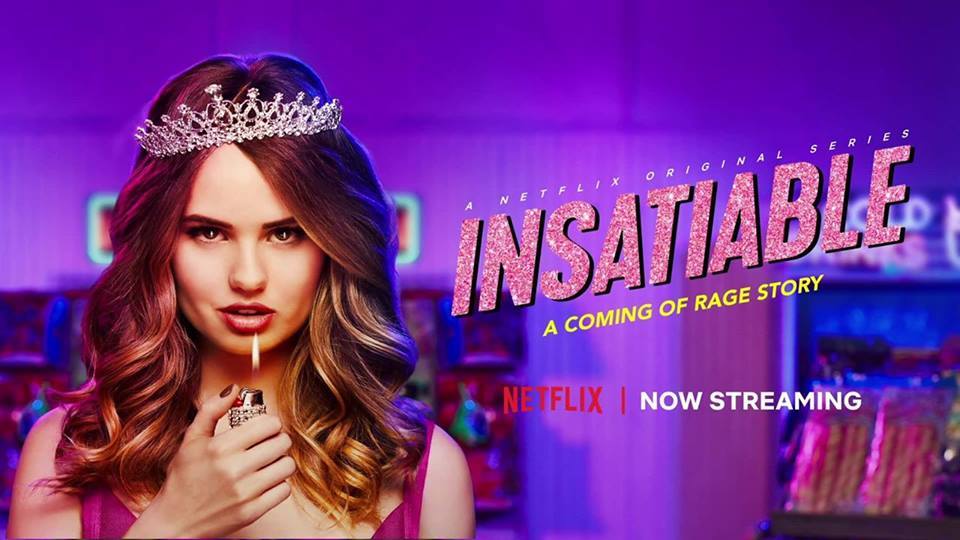Insatiable Is Not Only Fatphobic, it’s Biphobic as Well

On August 10, Netflix released its latest original series, Insatiable. Ever since the first trailer was released in July, Insatiable has been one of the most talked-about shows of the summer — but not in a good way. The show focuses on an overweight teen, played by thin actress Debby Ryan in a fat suit, who loses weight after having her jaw wired shut and then gets revenge on her bullies by participating in beauty pageants. The show has been called “Netflix’s worst show yet by far,” primarily for being fatphobic. Indeed, the show not only invalidates plus-size bodies, implying that people can only live their best lives when they are thin, but also idealizes eating disordered behavior, like doing a liquid diet and fasting, to lose weight.
As someone with an eating disorder, I knew Insatiable’s fat jokes and jokes about eating disorders would trigger me. What I was unprepared for, however, were the many biphobic jokes that were also a major part of the show’s storyline. Insatiable is full of bisexual jokes that not only drag out tired, false stereotypes and feed into stigma, but also add nothing to the show’s plot.
Most of the biphobic jokes in the show are aimed at or centered around the character Bob Armstrong, played by actor Dallas Roberts. Armstrong is a lawyer by day and beauty pageant coach by night. Bob is also bisexual, but is not immediately aware of this fact. Only as the series progresses does Bob realize that he has feelings for his rival, Bob Barnard (played by Christopher Gorham). When Bob tries to express those feelings, Barnard denies the sexual identity the feelings imply. “Tell yourself you’re bisexual,” Barnard tells Bob. “We all go through a phase. Bisexuals are like demons or aliens. They don’t exist.” To which Bob, ashamed of his identity because of Barnard’s comment, replies, “Totally agree. Bi is just a stop on the train to Gayville.” While the episode does ultimately end with Patty stating, “If demons are real, maybe bisexuals are too” — a supposed attempt to validate bisexuality, this line just compares bisexuals to demons, which is not a compliment.
Bi-erasure is unfortunately commonplace in the media. Orange Is the New Black waited seasons to actually allow Piper to claim her bisexual identity, and The Real O’Neals joked about bisexuality by comparing it to webbed toes. What’s more, there are countless TV shows and movies in which a character says something like “I go both ways,” “I don’t believe in labels,” or “it was a phase,” usually in passing. The representation of bisexuality as something that isn’t a “real” or permanent identity not only teaches non-bisexual people this false notion, but sends a damaging message of invalidation to bisexual viewers. Especially when shows (like Insatiable) that feature these comments and depictions are targeted at teenagers, who may be just discovering their sexuality, these young viewers are sent the message that their very real feelings are invalid. When they feel this type of invalidation, bisexual teens are less likely to be open about their sexuality or even explore it, repressing a major part of their identity, which can lead to major depression, according to Psych Center.
Unfortunately, the mere denial of bisexuality as a real identity isn’t even the worst part of Insatiable’s depiction. Bob is falsely accused of sexually assaulting the teenage girl he had coached for years — an accusation that is not only a horribly tone-deaf plot choice in the #MeToo era, but also an insulting reference to the damaging misconception that LGBTQ+ men are sexual predators and child molesters. Another painful bisexual stereotype the show relies on is that bisexuals are prone to cheating: Bob serially cheats on his wife, Coralee (Alyssa Milano), in the show. This depiction relies on the false notion that because bisexual individuals are attracted to all genders, they must not be able to be as faithful and monogamous as people only attracted to one gender. This stigma is so pervasive that bisexual people often discuss meeting people who refuse to date bisexual or pansexual people because they’re convinced “they’re just going to cheat.”
It took me years to come out as bisexual because of stigmas perpetuated about this identity in the media, and watching this show made me feel like I was right to be afraid. The message Insatiable sent to me was that my sexuality doesn’t matter, that I do not exist. Insatiable is supposed to be a comedy, a satire, but there is nothing humorous about invalidating someone’s sexuality. Satire is meant to poke fun of and challenge existing power structures, not directed at marginalized groups and experiences like plus-size bodies, eating disorders, and bisexuals.
More articles by Category: Disability, LGBTQIA, Media, WMC Loreen Arbus Journalism Program
More articles by Tag: Discrimination, Television



























